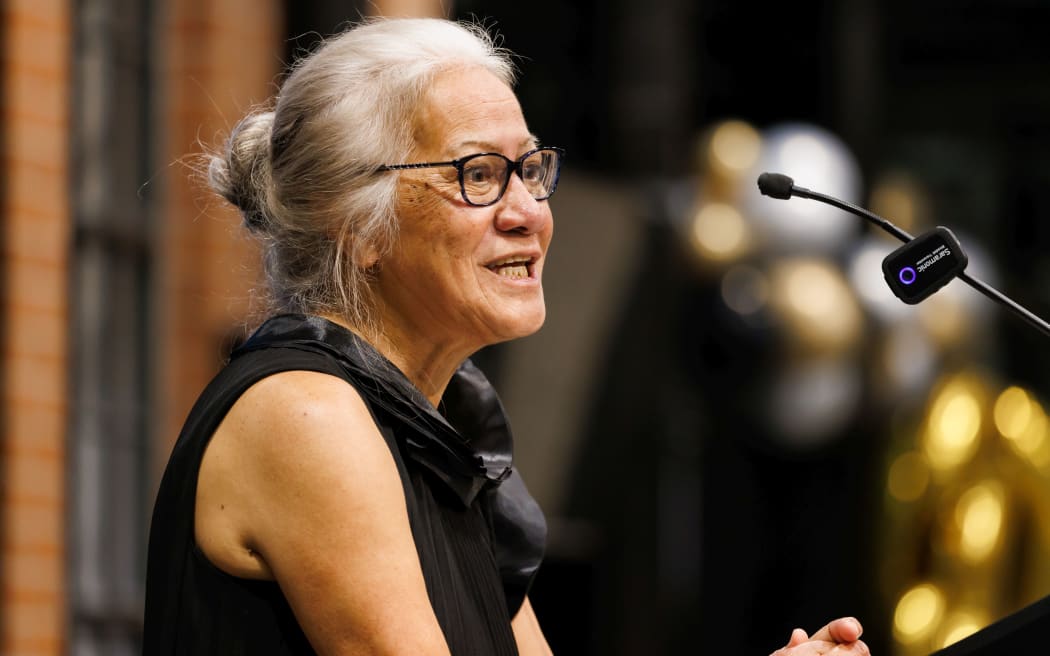
Annene Bosman is programme coordinator for enrolled nursing at Wintec Te Pūkenga in Hamilton and last year there was a 100 percent pass rate for its students who sat Enrolled Nursing exams. Photo: RNZ / Libby Kirkby-McLeod
Wintec Te Pūkenga in Hamilton had a 100 percent pass rate in Enrolled Nursing last year, and advocates say these courses are helping with the country's acute nursing shortage.
The enrolled nursing diploma takes 18 months to complete, compared to three years for a Bachelor of Nursing degree. Like registered nurses, enrolled nurses take care of patients, record vital patient information such as blood pressure and temperature, but they do not give medication by IV, or give patients controlled drugs. They work in hospitals, GP clinics and medical centres.
Last year, 115 candidates across New Zealand sat Enrolled Nursing exams, but Wintec Te Pūkenga in Hamilton achieved a perfect 100 percent pass rate, significantly surpassing the national average 87 percent. Wintec programme co-ordinator for enrolled nursing Annene Bosman said the diploma helped attract students into nursing who might not otherwise give it a go, for example mature students.
"They are really hard workers, really good attendees to class, really determined to pass. It makes them a really lovely group to teach," she said.

Wintec Te Pūkenga team leader of nursing Jan Liddell puts Wintec's perfect pass rate down to their holistic approach to teaching. Photo: Supplied / Mike Walen Keylmagery Photography
Jan Liddell, team lead of nursing at Wintec Te Pūkenga, agrees. She said one of her passions was to grow the Māori workforce and enrolled nursing provided an opportunity for Māori to enter the nursing workforce.
"It's now their time, all their commitments of raising their whānau are done, and now this is an opportunity for them to find their place in nursing."
Liddell puts the perfect pass rate Wintec Te Pūkenga achieved down to their holistic teaching approach, not just focusing on teaching the biomedical requirements of the diploma.
"Each of the teachers, and I'm one of them... we are ensuring we are meeting all their needs, pastoral as well as academic," Liddell said.
Ange Smyth is a current student who was encouraged to consider nursing while working as a health care assistant. She thought she might go on to a bachelors degree and become a registered nurse but has found enrolled nursing has been the best fit.
"It's just a shorter course, less student loan obviously, the classes are smaller. It's just easier to learn I think as an older student."
Another student who worked as a health care assistant before doing the diploma is Jullian Boys, who won the Wintec Te Pūkenga Best Student in Clinical Practice award last year.
She is now working at Waikato Hospital and said it had been a daunting transition but that the graduates still supported each other.
"We set up a chat group, and you put up if you've got a question. Everyone supports you, to try and help you understand what you couldn't understand."
Liddell said this whānau approach was a key to the successful pass rates and was something they put in place for Māori and Pacific students through a Tihei Mauri Ora stream. For example, the current students know a new intake are about to start and they take responsibility for them.
"Being the 'elder child' in the family, they know they have a responsibility to support and guide the new entrants."
The biggest barrier currently to increasing graduates out of the programme is finding enough places for students to get their practical experience. Liddell said the Nursing Council was working on helping people understand the enrolled nurse scope of practice and she hoped they would see growth in the workforce, especially in rural areas.

